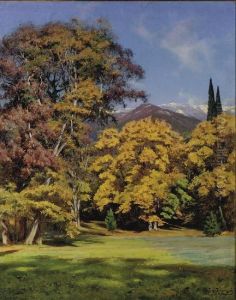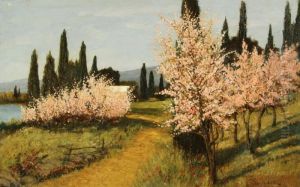Evstaf Evich Krachkovskii Iosif Paintings
Iosif Evstafievich Krachkovsky was a prominent Russian and Soviet Orientalist, an expert in Arab and Islamic studies, and a respected academician whose contributions to the field of Oriental studies have been significant and enduring. Born on November 15, 1884, in the Russian Empire, Krachkovsky's academic journey led him to become one of the foremost figures in the study of the Arab world and Islam during his lifetime, contributing to a deeper understanding and appreciation of these cultures in the Russian-speaking world.
Krachkovsky's career was distinguished by his profound scholarship on Arabic literature, his translations of significant Arabic works into Russian, and his academic writings that explored various aspects of Islamic culture, history, and religion. His dedication to the field was evident in his long tenure at the Institute of Oriental Studies of the Russian Academy of Sciences, where he mentored a generation of Orientalists, instilling in them a deep respect for and knowledge of the Islamic world.
Throughout his career, Krachkovsky was recognized for his exceptional ability to bridge cultures through his scholarly work. He was a prolific writer, and his translations made a vast array of Arabic literature accessible to Russian readers for the first time. His contributions went beyond translations; he also wrote extensively on the history of Arabic literature, Islamic culture, and the complex interplay between the Arab world and the West.
Krachkovsky's legacy is not only in his scholarly work but also in the significant influence he had on the development of Oriental studies in the Soviet Union. His dedication to his field earned him numerous awards and honors, both in the Soviet Union and internationally. He passed away on November 27, 1951, but his work continues to be a cornerstone of Arab and Islamic studies, serving as an invaluable resource for scholars around the world. Through his contributions, Krachkovsky played a pivotal role in fostering a greater understanding and dialogue between cultures, making him a figure of enduring importance in the annals of Oriental studies.


